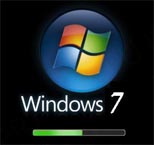Windows 7: More secure and more fun
 Munich - First impressions are important - and Windows 7 doesn't blow its chance. Even during the installation process, the new operating system from Microsoft - available in most of the world since October 22 - makes life easy for the user. That means more convenience and speed than Vista was able to provide. And Microsoft has included many new functions as well.
Munich - First impressions are important - and Windows 7 doesn't blow its chance. Even during the installation process, the new operating system from Microsoft - available in most of the world since October 22 - makes life easy for the user. That means more convenience and speed than Vista was able to provide. And Microsoft has included many new functions as well.
"We've fused together the best elements of XP and Vista," says Daniel Melanchthon of Microsoft Germany. That may sound like marketing talk, but there appears to be quite a bit of truth to it. Reviewers who have gotten their hands on the new version of Windows have generally had nothing to complain about.
Windows 7 is less demanding on hardware. That means that the operating system will also run relatively well on netbooks, according to Alex Vahldiek of German computer magazine c't.
"What's important is that the computer includes a quick hard drive," Vahldiek says. The processor is not so crucial, although at least a gigabyte of RAM should be available.
Microsoft let criticism of the previous version influence the design of Windows 7. Vista's user account control (UAC) function, for example, grated on many users with its constant stream of confirmation requests. Things work better now, says Peter Knaak, a computer expert for the German consumer testing organisation Stiftung Warentest in Berlin. Windows 7's UAC only checks in if programs attempt to make changes to the system.
Yet on the flip side this means that the default settings on Windows 7 might allow a bit too much leeway. "We successfully deactivated the antivirus software without a confirmation from Windows," says Vahldiek. That security hole is quite easy to fix, though: the user simply selects the highest security level in the User Account Control.
Windows 7 relieves users of a lot of the work. For example, during installation it recognises existing networks. Users simply select one and input the password - and the configuration is finished. New computers with Windows 7 pre-installed are also easy to integrate into a network.
"Microsoft has succeeded in making functions available in two or three mouse clicks fewer than before," Vahldiek says. That lets Windows 7 users work faster, even if the applications themselves run no faster. Few compatibility problems with older software have been reported to date.
Upgraders should make sure that their virus scanners will run under Windows 7. A cost-free update is generally enough. Windows 7 itself does not include a virus scanner, although like Vista and XP, it does include a firewall.
The most obvious difference to Vista is the new design. "We've cut the user interface back to the absolute necessary," Melanchthon says. At standard resolution the buttons on the starting screen are bigger, reflecting the fact that PC displays are getting bigger, which makes the symbols look smaller and smaller.
Windows 7 has many improvements - but is the jump worth it? Anyone who's happy with XP can stick with it for now, says Axel Vahldiek. "But there's also no reason not to make the switch," he says. Windows 7 is significantly more secure than its predecessors. "And it's more fun to use." (dpa)